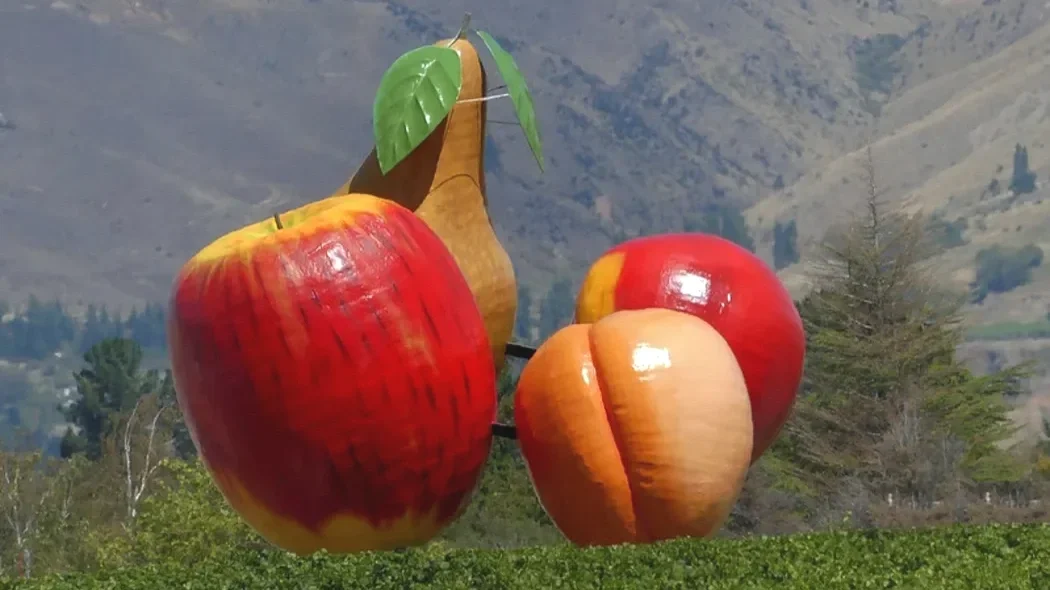Different, Not Perfect
I posted something on LinkedIn the other day, in relation to the notion that if you are migrating to New Zealand in the pursuit of perfection, you might be a little disappointed. It got some interest, and particularly the part about New Zealand being a bit quirky (as compared to many other countries). It also included a picture of the giant carrot in Ohakune, so that might have added to the engagement a little.
The message however is pretty relevant, because I often get the impression that some of my potential clients, think that New Zealand is paradise and whilst it is a great country, it is not entirely perfect. I tend to encourage these people to think of the move as being a pursuit of something different, but not perfect, because perfection is a pretty high expectation to meet.
When you make the move, there will be things that don’t work, aren’t to your liking or simply don’t make much sense. If you arrive here expecting perfection, then logically you will end up being disappointed. However if your goal is to find something different, new, interesting and perhaps a little quirky, then New Zealand will have an endless supply of all of those things.
For me, setting the right expectations for clients is really important because a move to another country is complex, emotionally challenging and can test even the most stoic of individuals. Coming here, understanding that New Zealand is not located at the end of a rainbow, but does have a lot going for it, helps clients to adjust a little more easily.
For the would-be migrant, there is a lot to get used to, a lot that is unusual and somewhat odd, and even just the really simple things can make a big difference in how easily (or not) that transition happens. By having the right level of expectations, I generally find my clients take these challenges in their stride, they expect them almost and that makes the whole move more enjoyable.
Expect The Unexpected
New Zealand isn’t exactly odd, but we do have a few quirks that people either finding endearing or just plain strange. Yes we have an enormous carrot in Ohakune, which is incidentally the carrot capital of the world (along with a vegetable themed, theme park), we have a giant bottle of fizzy drink located in a town which carries part of the name of that drink, some gargantuan fruit located in Cromwell and we have the worlds biggest gumboot in Taihape.
Our fascination with making ordinary, everyday objects super-sized is however, not really a key priority for migrants, whose greater concerns relate to access to healthcare, and education, being able to get to and from work and the potential to buy and own a home. In that regard most of things we do, are either pretty normal or in some cases just better than other countries.
Giant Fruit?
New Zealand isn’t perfect and some might say a little quirky - but it is that imperfection and our slightly different way of doing things that is attractive to migrants.
It is however, how we do some of those things that can be unexpected. I once had a client tell me that their biggest frustration with living in New Zealand was the fact that instead of five varieties of bread to chose from, we had 15. They were overwhelmed by the choices available, ironically making things more complicated.
I had another client coming from South Africa, who was concerned that she might have to do her own cleaning, gardening and general housekeeping (access to relatively cheap labour in South Africa, if you earn well is plentiful). She was not sure how she would manage to do these things on her own. She did of course and realised that most of us in New Zealand do the same thing, or we might outsource one or two items on the rare occasion to play catch up.
For most clients, it is appreciating that whilst many things are very similar to most countries in the world (usually fast-food chains and taxes), there are some things we do differently. Understanding that early on is really important and even just the small things, and knowing how they differ between where you are and where you are going to end up, can make all the difference.
Whenever I speak to clients from countries with a really efficient and cheap public transport system, I warn them, that New Zealand is a country where most people prefer to drive. We have public transport, but it isn’t always efficient or that cheap. Being prepared to adjust in these circumstances can take some of the frustration out of that initial move and leave you a little less disappointed.
What Is Motivating Your Move
When we talk about pursuing “better” rather than “perfection”, it is often very dependent on where you are coming from. For some migrants, no matter what challenges they face here in NZ, this place might seem pretty perfect, however for most skilled migrants, who have good jobs, earn a decent living and live a comfortable lifestyle, no matter where they come from, there will always be things that they don’t like.
I recall being on a ferry many years ago, travelling from one part of Auckland to another, overhearing a group of new arrivals to New Zealand talking about how things just weren’t the same here as compared to their home country. The beer was different, the people were different and the food was different. Their list of differences went on for quite a while and I couldn’t help feeling a little annoyed.
Find Your “Why”.
Every migrant will have their own motivation for making the move, and its important to hold on to that reason as you complete the process.
We don’t offer people the same things as where they came from, for very good reason - we are an entirely different country (and arguably our beer and food are much better). If you move here, you absolutely have to expect things to be different and ultimately adapt to them - heck even try and embrace them.
Where many migrants go wrong, is in expecting things to be the same, and being disappointed when they aren’t. If you migrate here, expecting a better version of what you left behind, it won’t happen and my advice is just dont come at all. That might sound harsh, but in my more than two decades of doing this work, I have seen the effects of unrealistic expectations, ultimately resulting in people packing up and going back to their country of origin anyway. Be prepared to embrace the new and the different and your experience will be completely different.
Motivation, and the reasons for coming here are all tied in to that, and I sometimes think people forget the “why” that pushed them to this country in the first place. I have met people who have spent an hour complaining about something in their home country, only to arrive here a few months later and complain about the very same thing over here - usually because they have the wrong expectations.
If you are motivated to move, make sure its for the right reasons and accept that moving here, may not solve every problem you have. I had a couple approach me once, keen to relocate to save their marriage, and whilst I am about as far away from a marriage counsellor as you can get, I suggested that they rethink their decision. Migrating won’t fix you, but it will give you the opportunity to experience something new, and to be part of something different. Yes we do have plenty of things that work better here, than other places, but also things that don’t work as well.
Your motivation has to be based on understanding that and having the right expectations over what your new life in New Zealand might look like - not perfect, not better, but different.
Our DIY Approach
One of the things that New Zealand tends to be pretty well known for, and it can take some getting used to is what we call our No.8 wire mentality, which implies that we like to try and do as much as we can, with as little as we can - using our ingenuity (and an attempt to save some money). The actual term comes from a guage of wire (No.8) that was imported into New Zealand from the UK, and became the standard wire used in farm fencing. Farmers however soon realised you could fix a lot of things with the same wire and so it began propping up machinery, the basis for many household repairs and also features in quite a bit of art.
No.9 Wire
New Zealand has a way of doing a lot with very little - we call it the No.8 wire mentality. Fix a car with some bubble gum, and an old shoe lace? Absolutely.
Taking one thing and adapting it for many other things, became the underlying basis for the Kiwi “can do” approach to life, although sometimes we might overstate what we actually can do.
One of the most famous examples of the No.8 wire mentality was Bert Munro, the Invercargill motorcycle racer made famous in The World’s Fastest Indian (which is a great moving starting Anthony Hopkins).
Bert purchased a 1920 Indian Scout motorcycle and with almost no money or resources, spent decades trying to make it go as fast as humanly possibly in his shed (the shed in which he also lived). Lacking access to advanced engineering tools, he hand-crafted parts, cast pistons himself, and improvised with whatever materials he could find - the No. 8 wire approach. Against all odds, his bike set world speed records at Bonneville Salt Flats in the 1960s.
You might be wondering what No.8 wire has to do with migrating to New Zealand, however it all comes back to that ability to adapt and change. New Zealanders on the whole are pretty good at it, we do what we can with what we have and in some ways, if you can adopt the same approach to your move, it will be far more successful.
That doesn’t mean of course that you have to settle for second best (NZ is still a fantastic place) but appreciating that it isn’t perfect and you might have to adjust a bit as you settle in, deploying a bit of No.8 wire here and there, will be incredibly useful. You may not find the perfect house to live in when you first arrive, but over time you will probably move around a bit anyway - it will take time to navigate our transport systems, healthcare, education and everything else that forms part of daily life, but you will make do as you figure it all out and you will come to realise that we still have issues, and problems that we all love to moan about, but eventually you will appreciate they aren’t of the same scale as you might be used to.
And if Bert was here now (he passed away in 1978) he might repeat to any prospective migrants one of his more notable sayings ““If you don’t go when you want to go, when you do go, you’ll find you’re gone.”
Go For Different, Not Perfection
Hopefully by now you will have gathered that my advice to anyone considering this move is to do some homework and prepare not for a move to paradise but to somewhere where you can build something different. Don’t expect to find a better version of where you are coming from, but expect it to have many things that might be the same and a whole lot more that aren’t.
Those applicants who come here, but then end up leaving in a year or two, often do so because New Zealand didn’t live up to their expectations, although I would ask them what those expectations were to begin with. If you appreciate that life here is different, things move at a different pace, and people act and behave differently, you will soon figure out how to adjust.
Migrating takes a bit of that Bert Munro attitude - particularly as things can and do change along the way. You adjust, you adapt and you aim to get across the finish line as quickly as you can and in one piece. Some practical tips you can use if you are considering the move:
Adjust your mindset - See quirks and frustrations as part of the adventure.
Clarify your motivation - Be honest about why you want to move (lifestyle, safety, opportunities, education, family), and make sure your reasons outweigh the inevitable inconveniences.
Research daily life in NZ - Learn about food, shopping, and everyday chores — things may be less convenient or more expensive, look into housing markets, healthcare access, and transport options. .
Prepare for cultural differences - Understand the Kiwi “DIY” and “No. 8 wire” approach to problem-solving. Expect to do more tasks yourself (repairs, gardening, home maintenance), and get ready for smaller cities and towns with their own unique quirks.
Find community and support - Connect with other migrants and locals to share experiences and build a support network early — social connections ease the transition.
Give yourself time - Adjusting takes months, sometimes years. Stay open to learning, adapting, and finding your own rhythm.
Keep perspective - Focus on the trade-offs: safety, space, and quality of life often outweigh lost conveniences. Remember: NZ is not perfect, but it can be wonderfully different.
Apart from all the technical expertise we bring to this process, if there is one thing above all else that I take great pride in being able to do, it is to try and make sure my clients have the right expectations when they decide to make the move. I help them to understand that it wont be all lollipops and rainbows, and in doing so, I hopefully set them up for success.
So if you are looking to make the move, don’t strive for perfection, aim for different and you will be sure to hit the right mark.
Until next week.




